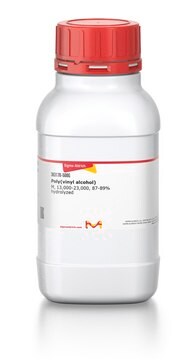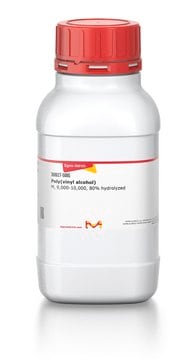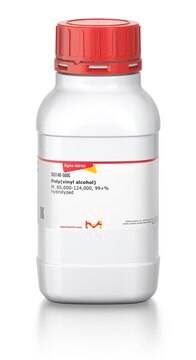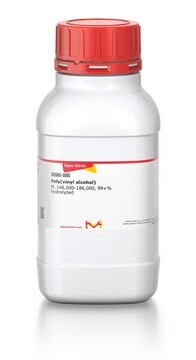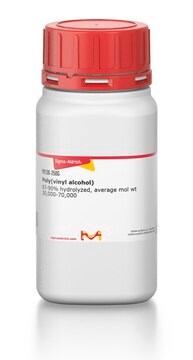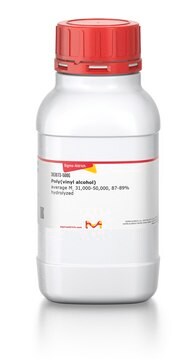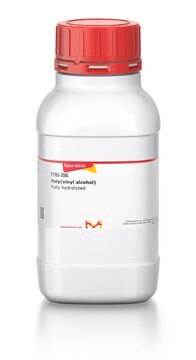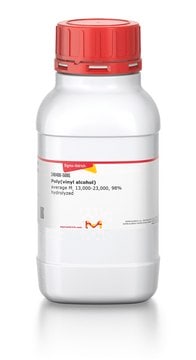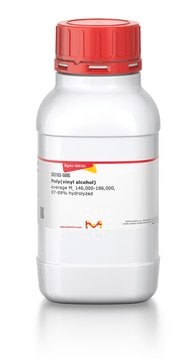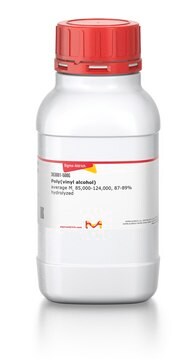363138
Poly(vinyl alcohol)
Mw 31,000-50,000, 98-99% hydrolyzed
Synonym(s):
PVA
Sign Into View Organizational & Contract Pricing
All Photos(2)
About This Item
Linear Formula:
[-CH2CHOH-]n
CAS Number:
MDL number:
UNSPSC Code:
12352104
NACRES:
NA.23
Recommended Products
Quality Level
form
powder
mol wt
Mw 31,000-50,000
falling ball
5.4-6.5 cP, 4 % in H2O(20 °C)(lit.)
InChI
1S/C2H4O/c1-2-3/h2-3H,1H2
InChI key
IMROMDMJAWUWLK-UHFFFAOYSA-N
Looking for similar products? Visit Product Comparison Guide
General description
Poly(vinyl alcohol) (PVA) is a vinyl based water soluble polymer that can be used as a non-ionic surface active agent. It can also be used as a biodegradable polymer and can be incorporated in adhesives, coatings, textiles, ceramics and cosmetics. Its properties include good transparency, chemical resistance, toughness and anti-electrostatic properties.
Application
PVA can be used for a variety of applications such as:
- a stabilizer in the synthesis of nanoparticles
- preparation of biodegradable polymeric nanoparticles for biomedical applications
- immobilization of glucose oxidase for the development of a biosensor
Storage Class Code
11 - Combustible Solids
WGK
WGK 1
Flash Point(F)
No data available
Flash Point(C)
No data available
Personal Protective Equipment
dust mask type N95 (US), Eyeshields, Gloves
Choose from one of the most recent versions:
Already Own This Product?
Find documentation for the products that you have recently purchased in the Document Library.
Customers Also Viewed
A facile approach of light driven nanoassembly for the controlled accommodation of doxorubicin
Kollarigowda RH, et al.
Biomedical Physics & Engineering Express, 3(4), 045006-045006 (2017)
Plastics Materials, 386-397 (1999)
C Bradac et al.
Nature nanotechnology, 5(5), 345-349 (2010-04-13)
Nitrogen-vacancy colour centres in diamond can undergo strong, spin-sensitive optical transitions under ambient conditions, which makes them attractive for applications in quantum optics, nanoscale magnetometry and biolabelling. Although nitrogen-vacancy centres have been observed in aggregated detonation nanodiamonds and milled nanodiamonds
Carmen Gomes et al.
Journal of food science, 76(2), N16-N24 (2011-05-04)
Eugenol and trans-cinnamaldehyde are natural compounds known to be highly effective antimicrobials; however, both are hydrophobic molecules, a limitation to their use within the food industry. The goal of this study was to synthesize spherical poly (DL-lactide-co-glycolide) (PLGA) nanoparticles with
Jason Park et al.
Molecular pharmaceutics, 8(1), 143-152 (2010-10-28)
Within the immune system there is an exquisite ability to discriminate between "self" and "non-self" that is orchestrated by antigen-specific T lymphocytes. Genomic plasticity enables differentiation of naive CD4+ T lymphocytes into either regulatory cells (Treg) that express the transcription
Our team of scientists has experience in all areas of research including Life Science, Material Science, Chemical Synthesis, Chromatography, Analytical and many others.
Contact Technical Service
